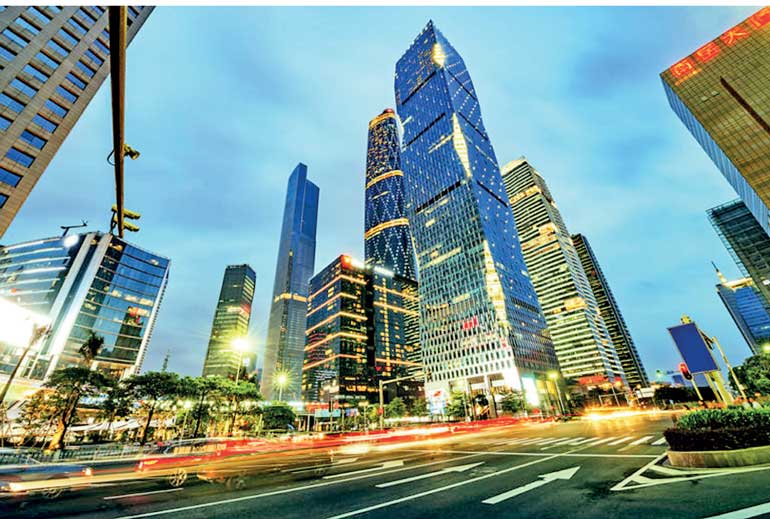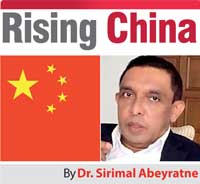Thursday Feb 19, 2026
Thursday Feb 19, 2026
Wednesday, 16 February 2022 00:00 - - {{hitsCtrl.values.hits}}

Today, China’s influential position in the world economy is undisputable
This paper is based on the interview with Prof. Rev. Wijithapure Wimalaratana Thero of the University of Colombo on ‘Rising China and Lessons for Sri Lanka’. The interview series was launched by the Veemansa Initiative – an independent think tank in the areas of economic, political and social issues. Through this interview series, Veemansa brings about the views of intellectuals and experts on various dimensions of the miraculous development experience of China, by drawing lessons, parallels and prospects for Sri Lanka.
Within a short period of time, China has transformed to be the most authoritative economy in the world, while it has also become a militarily powerful and politically influential nation among the world superpowers. When we try to understand today’s economy of China, we need to comprehend it from a historical perspective as well.
superpowers. When we try to understand today’s economy of China, we need to comprehend it from a historical perspective as well.
Turning points
There are important turning points of economic transformation in the modern development history of China. On 1 October 1949, Chinese Communist leader Mao Zedong declared the creation of the People’s Republic of China (PRC) after a long struggle against the existing regime of the Republic of China. Since then, for nearly three decades, the economic way forward in China was shaped by the Communist rule.
The Great Leap Forward was a five-year plan of forced agricultural collectivisation and rural industrialisation that was instituted by the Chinese Communist Party in 1958-1962. While the five-year planning which was not abandoned even after initiating the market-oriented policy reforms after the Mao regime, continued to remain up to now; today China has been implementing its 14th five-year plan.
Another historical turning point of the transformation of modern China was the Cultural Revolution 1966-1976. The goal of the revolution was to enforce Communism and to remove any foreign or Capitalist influence as well as the traditional cultural traits of the remaining within the Chinese society itself.
After the demise of Mao Zedong, the Communist leader Deng Xiaoping proceeded to carry out his own policies for economic development of China with emphasis on opening the economy for international trade and investment, establishing private property rights and creating a series of Special Economic Zones (SEZs).
When China joined the World Trade Organization (WTO) in 2001, it was still a minor player on the global manufacturing stage. But within the past 20 years, its progress was fast and became the second largest economy in the world ousting Japan in 2010.
China in the world economy
Today, China’s influential position in the world economy is undisputable. It has the largest population in the world amounting to 1.4 billion people, followed by India, the US and Indonesia. In terms of
 |
| Prof. Rev. Wijithapure Wimalaratana Thero |
geographical size, it is the fourth largest country in the world after Russia, Canada, and the USA.
Although in nominal terms, the GDP of China is still behind that of the USA, the IMF data indicate that according to PPP-adjusted GDP estimates China has already become the world’s largest economy since 2014. PPP-adjusted GDP reflects the cross-country differences in the Purchasing Power Parity (PPP) of a US dollar.
China holds the largest stock of foreign exchange reserves in the world amounting to USD 3.3 trillion. While the US continues to have a trade deficit which is covered by the foreign borrowings, China has been the biggest lender to the US. The value of the Special Drawing Rights (SDR) maintained by the IMF is determined by a basket of five major currencies in the world; the Chinese currency, Renminbi was added to this basket as the fifth currency in 2016, while the other currencies are the US dollar, Euro, Japanese yen and the British pound. China is the largest food producer in the world, largest industrial producer in the world, and the largest industrial exporter in the world.
China has a long history of innovations running back to centuries. Gunpowder, paper and compass are examples for some of the influential Chinese inventions in history. The Chinese Great Wall is a historical monument that has been considered as one of the seven wonders in the world. The nation has also mastered the silk industry and martial arts.
Underlying factors
Historically, China was one of the world’s foremost economic powers for most of the two millennia from the 1st until the 19th century. Now China has actually regained its lost world power. Large size of the labour force which supplied cheap labour at early stages of development has been a major contributory factor to attract investment to China. The labour force is equipped with positive working attitudes, while the Chinese are hard-working people. The well-known “996” is a shorthand term used to depict their attitude towards working schedule, spanning from 9 a.m. to 9 p.m. and, six days of the week.
China has a massive local market which provides enough space for industries to grow and expand, by deriving the low-cost benefits of economies of scale. However, China does not depend on its local market; the Chinese government always pushes their local industries to penetrate the global market and even to invest and expand outside China.
‘One Belt, One Road’ initiative of President Xi Jinping in 2013 reflects China’s global vision. The term derives from the overland ‘Silk Road Economic Belt’ and the ‘21st-Century Maritime Silk Road’ – the concepts introduced by the President. It was designed to improve connectivity and cooperation among the countries in Asia, Africa and Europe for future development of China and the global economy, aiming at promoting trade and investment, and reducing poverty.
China is also a smoothly running society in a sense that there are no frictions interfering or constraining economic growth. This element is related to the country’s one-party political system that was not changed with policy reforms. The Chinese system is a new arrangement with market-oriented policy reforms adopted within the existing political and administrative mechanisms of the Communist type. It has assured the international investors of the country’s political and economic stability with consistent and predictable policy and regulatory environment.
There are, however, worrying factors too which may be important to note in a discussion on the country’s miraculous economic development, which are either territorial or geopolitical issues, including the conflicts with Hong Kong and Taiwan. The South China Sea involves a wide array of complex issues covering sovereignty over islands and reefs, maritime delimitation, maritime security, cooperation against piracy and terrorism, resource development and environmental protection.
Apart from the above, environmental issues, political reforms and the future of the Chinese Communist Party, human rights and religious freedom, legal reforms, corruption, and demographic issues have posed challenges to the Chinese government to deal with.
Benefits to Sri Lanka
Under the Rubber-Rice Pact between China and Sri Lanka, signed in 1952, China has generously offered for Sri Lankan rubber 40% higher than the market price and supplied rice to Sri Lanka at one-third less than the market price. This generosity is a sign of friendship between the two countries, which has not been polluted up to now.
As of today, China has invested in creating the Colombo Port City on reclaimed land, while extending investment to several other key economic sectors, including infrastructure, roads, and power in Sri Lanka. China has also provided support to Sri Lanka when some other countries turned aside helping to win the separatist war and standing together with Sri Lanka in difficult times.
This strong relationship between the two countries is an indication that Sri Lanka is in a competitive position to benefit from not only the bigger Chinese market access and tourism, but also in a much broader sense from the Chinese economic development as well as from its global expansion.
(The writer is a Professor in Economics at the University of Colombo who conducted the interview series on Rising China.)